37th Carnival of Nuclear Energy Bloggers
 The 37th Carnival of Nuclear Energy Bloggers is now up at Idaho Samizdat.
The 37th Carnival of Nuclear Energy Bloggers is now up at Idaho Samizdat.
The ANS Nuclear Cafe is a blog owned and edited by the American Nuclear Society. Information contained on the ANS Nuclear Cafe has been provided by numerous sources. Therefore, the American Nuclear Society assumes no responsibility or liability for the accuracy of information contained herein. DISCLAIMER: The views expressed in posted articles do not necessarily reflect the views of the American Nuclear Society. The views expressed here are those of the individual authors. ANS takes no ownership of their views. The American Nuclear Society assumes no responsibility or liability for any use or operation of any methods, products, instructions, or ideas contained on this site.

 The 37th Carnival of Nuclear Energy Bloggers is now up at Idaho Samizdat.
The 37th Carnival of Nuclear Energy Bloggers is now up at Idaho Samizdat.
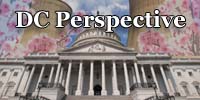 In his State of the Union speech on January 25, President Barack Obama advocated a Clean Energy Standard that includes natural gas as well as renewables, nuclear and "clean coal." In my previous post on Clean Energy Standards, I said that if the standard were expanded to include natural gas generation, then the required clean energy percentage would have to be increased substantially in order for the policy to remain meaningful, particularly if gas is given "full credit" (i.e., is treated no differently than non-emitting generation).
In his State of the Union speech on January 25, President Barack Obama advocated a Clean Energy Standard that includes natural gas as well as renewables, nuclear and "clean coal." In my previous post on Clean Energy Standards, I said that if the standard were expanded to include natural gas generation, then the required clean energy percentage would have to be increased substantially in order for the policy to remain meaningful, particularly if gas is given "full credit" (i.e., is treated no differently than non-emitting generation).
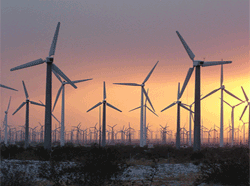 It is often stated that since no one can charge money for the wind, wind-generated electricity is free. This is not true. A modern wind turbine, which can generate 2 megawatts of electricity (MWe) when the wind is blowing, costs about $3.5 million installed. Five hundred of these turbines installed at a wind farm, to be able to generate 1000 MWe, would cost $1.75 billion. Add in other costs, such as for operation and maintenance (O&M) and transmission lines, and the total sum could match the approximate $4 billion required to build a nuclear plant.
It is often stated that since no one can charge money for the wind, wind-generated electricity is free. This is not true. A modern wind turbine, which can generate 2 megawatts of electricity (MWe) when the wind is blowing, costs about $3.5 million installed. Five hundred of these turbines installed at a wind farm, to be able to generate 1000 MWe, would cost $1.75 billion. Add in other costs, such as for operation and maintenance (O&M) and transmission lines, and the total sum could match the approximate $4 billion required to build a nuclear plant.
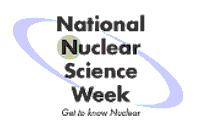 Excelsior College on Wednesday, January 26, is hosting a webinar, Can the U.S. Catch the World in the Nuclear Power Race? which will bring together scholars and nuclear technology practitioners from across the United States for a panel discussion on the subject matter. The event is being held in conjunction with National Nuclear Science Week.
Excelsior College on Wednesday, January 26, is hosting a webinar, Can the U.S. Catch the World in the Nuclear Power Race? which will bring together scholars and nuclear technology practitioners from across the United States for a panel discussion on the subject matter. The event is being held in conjunction with National Nuclear Science Week.
National Nuclear Science Week, January 24-28, is underway across the United States and is being promoted in Minnesota with activities that include tours of PaR Nuclear's facility, a student essay competition, and trivia contests.
View from Vermont
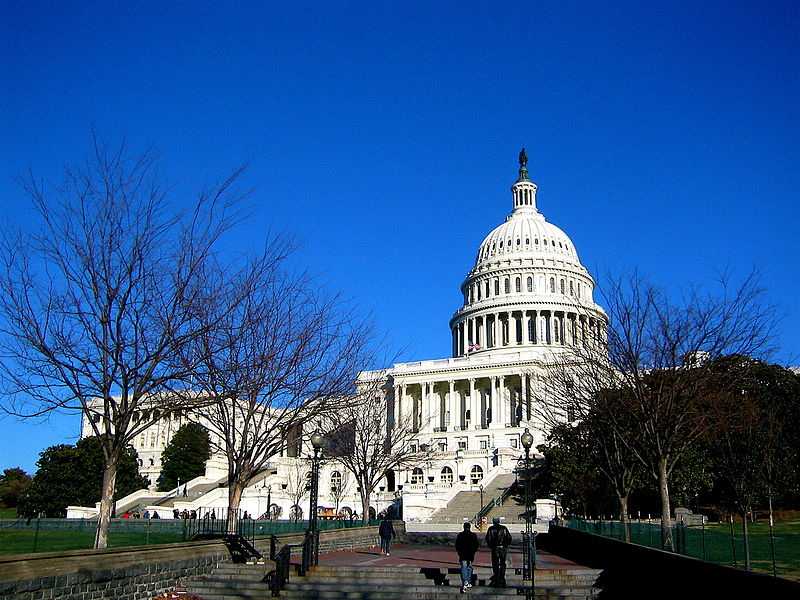 Leading figures from Congress, the commercial nuclear industry, and academia will convene on January 27 on Capitol Hill in Washington, D.C., to detail the contributions of nuclear technology and the possibilities associated with education in nuclear science. Senate Energy and Natural Resources Committee Chairman Jeff Bingaman (D., N.M.) will be the featured speaker at a discussion of the contributions, innovations, and opportunities that can be found by exploring nuclear science.
Leading figures from Congress, the commercial nuclear industry, and academia will convene on January 27 on Capitol Hill in Washington, D.C., to detail the contributions of nuclear technology and the possibilities associated with education in nuclear science. Senate Energy and Natural Resources Committee Chairman Jeff Bingaman (D., N.M.) will be the featured speaker at a discussion of the contributions, innovations, and opportunities that can be found by exploring nuclear science.
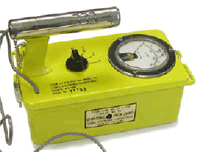 The American Nuclear Society's Public Education Program will be sponsoring a one-day teacher workshop on Sunday, February 27, at the Phoenix Convention Center in Phoenix, Ariz. The workshop-Detecting Radiation in Our Radioactive World-is intended for science educators (including biology, chemistry, earth science, physics, physical science, life science, environmental, and general science) at the high school and middle school levels. WM Symposia, Inc., is cosponsoring the workshop, which will be held prior to WM2011, the international waste management conference that is held in Phoenix.
The American Nuclear Society's Public Education Program will be sponsoring a one-day teacher workshop on Sunday, February 27, at the Phoenix Convention Center in Phoenix, Ariz. The workshop-Detecting Radiation in Our Radioactive World-is intended for science educators (including biology, chemistry, earth science, physics, physical science, life science, environmental, and general science) at the high school and middle school levels. WM Symposia, Inc., is cosponsoring the workshop, which will be held prior to WM2011, the international waste management conference that is held in Phoenix.
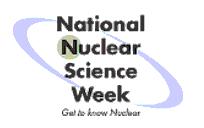 On Saturday, January 22, the Chicago ANS Local Section launched the activities for National Nuclear Science week a day early by presenting a student nuclear science workshop, hosted by the Chicago Museum of Science and Industry (MSI). Chicago MSI-the largest science museum in the western hemisphere-included the workshop as part of the Scientist at Work series, in which high school science achievers learn about different science disciplines and career paths.
On Saturday, January 22, the Chicago ANS Local Section launched the activities for National Nuclear Science week a day early by presenting a student nuclear science workshop, hosted by the Chicago Museum of Science and Industry (MSI). Chicago MSI-the largest science museum in the western hemisphere-included the workshop as part of the Scientist at Work series, in which high school science achievers learn about different science disciplines and career paths.
The voice of the nuclear renaissance is found in a weekly wrap up
Eric Loewen, the American Nuclear Society's vice president/president-elect, appeared on the Good Day Columbia (South Carolina) television show on the morning of January 21 to discuss nuclear energy technologies and nuclear-related activities in South Carolina.
 At a session on educational programs during a recent ANS meeting, a fairly new graduate student in nuclear engineering described a nuclear survey course that he had taken at his university. The graduate student had not studied nuclear engineering as an undergrad, and when he said, "I had never really heard of Chernobyl before I took this course," you could almost hear an audible gasp among the more, well, mature members of the audience.
At a session on educational programs during a recent ANS meeting, a fairly new graduate student in nuclear engineering described a nuclear survey course that he had taken at his university. The graduate student had not studied nuclear engineering as an undergrad, and when he said, "I had never really heard of Chernobyl before I took this course," you could almost hear an audible gasp among the more, well, mature members of the audience.
No deals for reactor components without
The views expressed in this article are the author's, and do not represent the editorial position of Nuclear News magazine or the policy of the American Nuclear Society.
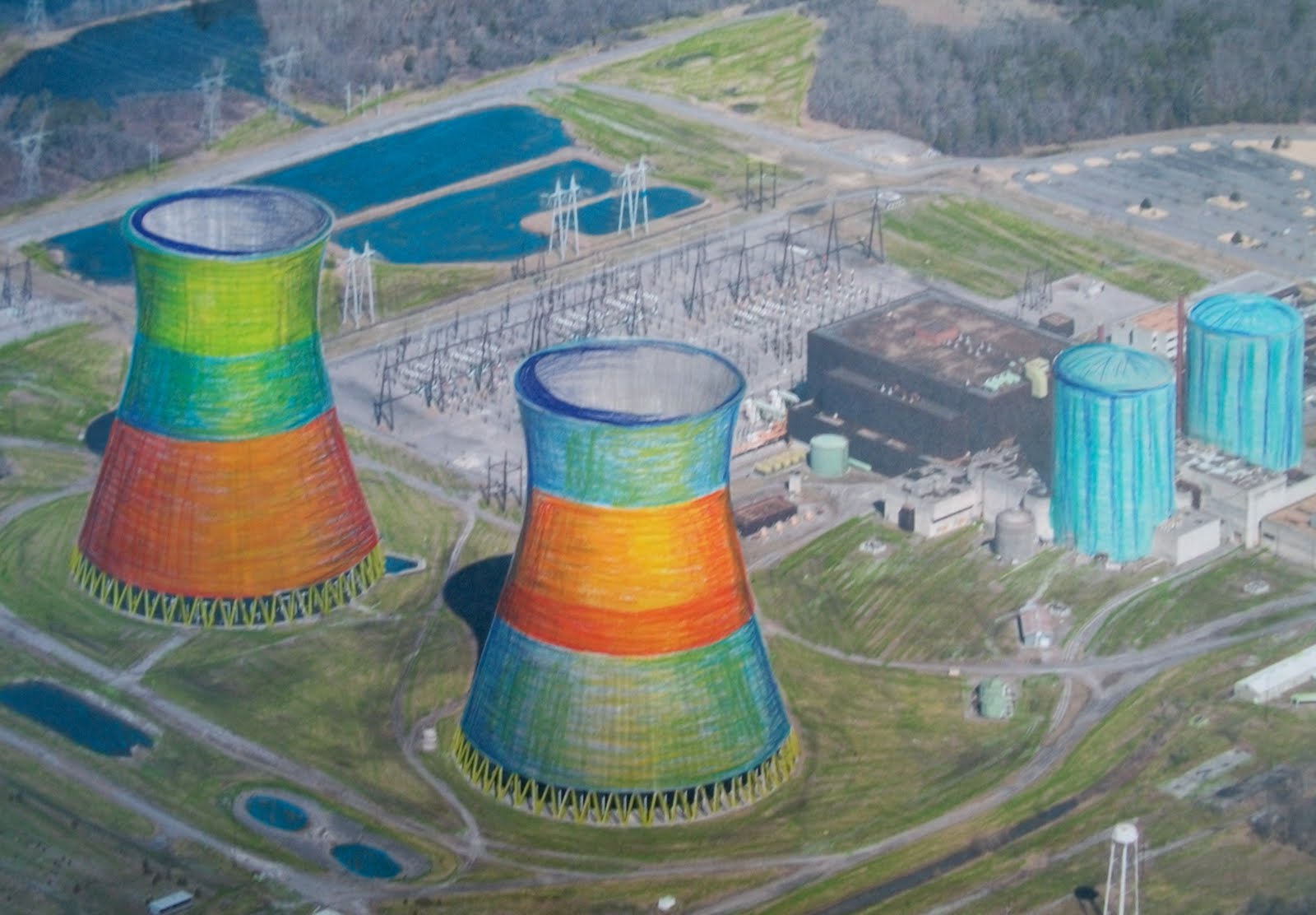
TVA's Bellefonte rising! ~ Graphic by Suzy Hobbs at Pop Atomic Studios
The 35th Carnival of Nuclear Energy Blogs is up at NEI Nuclear Notes. The carnival features blog posts from the leading U.S. nuclear bloggers and is a roundup of featured content from them.
A few months ago, I had the honor of leading a class of future engineering leaders at Iowa State University. The dean, Dr. Jonathan Wickert, occasionally asks alums and others who have done interesting things with their engineering degrees to come in and lead the class in a case study. Events in the Gulf of Mexico that started in April 2010 with the Macondo oil spill provided an excellent opportunity to talk about crisis management and communications, with the added benefit of current technology relevance. This is an area that the nuclear industry also needs to study and understand.
By Suzanne Hobbs
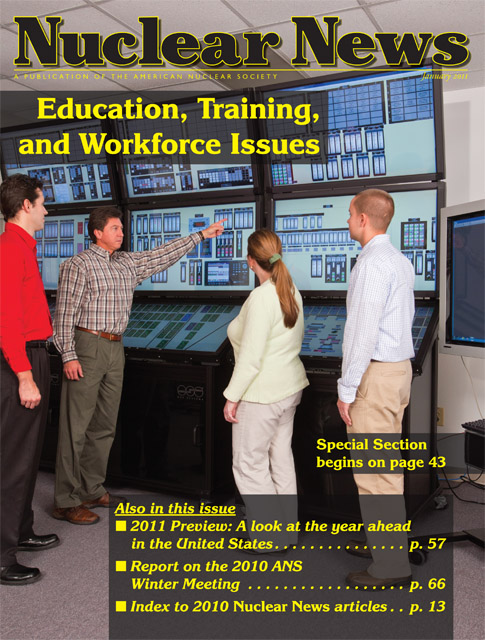 The January issue of Nuclear News has been published and mailed to American Nuclear Society members, and is available electronically to members. The issue contains a special section on education, training, and workforce issues. Features include:
The January issue of Nuclear News has been published and mailed to American Nuclear Society members, and is available electronically to members. The issue contains a special section on education, training, and workforce issues. Features include:
Vermont's new governor, Peter Shumlin, was inaugurated on January 6, 2011. He ran as the Vermont Yankee nuclear power plant's number one enemy, as he stated.